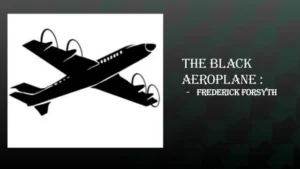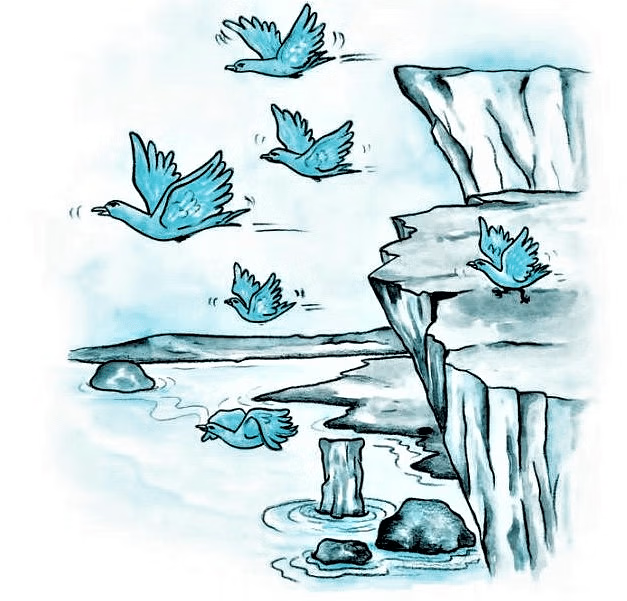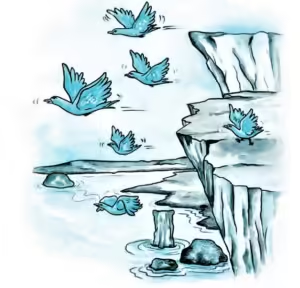NCERT Solutions for Class 10 English Chapter 3
Two Stories About Flying
I. His First Flight
NCERT Solutions for Class 10 English Chapter 3
Thinking about the Text
Question 1: Why was the young seagull afraid to fly? Do you think all young birds are afraid to make their first flight, or are some birds more timid than others? Do you think a human baby also finds it a challenge to take its first steps?
Answer: This was the baby seagull’s first flight, and he was scared of heights and the possibility of getting wounded. When he tried to make his maiden flight, he believed that his wings would not hold him.
Yes, it is understandable and normal that trying anything new can be both intimidating and a little difficult. Undoubtedly, the fear of taking off must afflict every bird.
Similar to this, when a human infant takes its first steps or learns to crawl or walk on its own without assistance, it too experiences fear and struggles greatly.
Question 2: “The sight of the food maddened him.” What does this suggest? What compelled the young seagull to fly finally?
Answer:
The juvenile seagull was unable to get the bravery to attempt his first flight. His family was often admonishing him to jump, but it didn’t work. They allowed him to remain perched on the edge until he felt confident enough to jump. By the time he was left there for almost twenty-four hours, he was ravenous. He was finally forced to fly because of this hunger. In addition, he became even more hungry upon witnessing his mother ripping at a piece of fish that rested at her feet.
He begged her to buy him some food while he sobbed in desperation. Upon witnessing this, the young seagull let out a joyful and excited cry as his mother approached him, carrying food in her beak. But halfway through, she stopped, and the juvenile seagull questioned why she had not approached him more. He swam for the food in his mother’s beak, driven insane with hunger. At that point, he plummeted forth and down into the vast ocean below the rock. His heart stopped, utterly afraid. However, he quickly became aware that he could fly like others as he felt his wings grow widely. As a result, his hunger overcame his fear, and he enthusiastically completed his maiden flight.
NCERT Solutions for Class 10 English Chapter 3
Question 3: “They were beckoning to him, calling shrilly.” Why did the seagull’s father and mother threaten him and cajole him to fly?
Answer: The juvenile seagull made every effort to take his maiden flight, as his parents were always urging him. Nevertheless, his dread of plunging from the cliff made him exceedingly hesitant to jump. Despite his reluctance to put forth any effort, he glanced at his brothers and sister before they took off. Because of this, his entire family had abandoned him on his perch and tried in vain to scare and cajole him into taking flight.
Question 4: Have you ever had a similar experience, where your parents encouraged you to do something that you were too scared to try? Discuss this in pairs or groups.
Answer:
Yes, I had a similar experience when I was trying to learn how to ride a bicycle in the fourth standard. At first, I had trouble balancing and fell a lot, which made me fear cycling. I couldn’t get over my fear, so I gave up, but my parents would always nag me to try and practice whenever I had free time.
My father would hold the bicycle behind me to help me balance, but if he removed his hand, I would lose my balance and fall. Eventually, though, as I continued to practise every day, my cycling skills improved to the point where I could ride the bicycle without my father’s assistance. My confidence was much enhanced by this as well. As a result, after practicing every day, I was able to overcome my anxiety of riding a bike and began riding with confidence. I now follow a routine when traveling to and from school each day.
(Note: This response can be written by students based on their own experiences. )
NCERT Solutions for Class 10 English Chapter 3
Question 5: In the case of a bird flying, it seems a natural act, and a foregone conclusion that it should succeed. In the examples you have given in answer to the previous question, was your success guaranteed, or was it important for you to try, regardless of a possibility of failure?
Answer:
When attempting to learn or acquire a new ability, it is normal for everyone to experience some early difficulties. We are frequently reluctant to complete a task or try something new because we are afraid of failing. The seagull’s parents persuaded him to take to the skies on a regular basis. In a similar vein, my father consistently encouraged me to learn how to ride a bike when I was learning it for the first time. At that point, it was crucial for me to get over my phobia and learn how to ride a bike for my own benefit.
Yes, my success was certain as success comes naturally to those who are driven and focused on achieving their goals. In addition, everyone has heard the well-known proverb “Practice makes perfect.”
NCERT Solutions for Class 10 English Chapter 3

II. The Black Aeroplane
Thinking about the Text
Question 1: “I’ll take the risk.” What is the risk? Why does the narrator take it?
Answer: In order to enjoy a vacation with his family in England, the pilot of the Dakota DS 088 aircraft was eager to go home. A massive storm of dark clouds overtook his jet while it was traveling. Hence, he made the decision to go off directly into the storm in order to meet his family for a hearty English breakfast. He decided to take the chance of flying into the storm despite the nearly complete lack of vision.
Question 2: Describe the narrator’s experience as he flew the aeroplane into the storm.
Answer:
The author’s aircraft began to swerve and leap as it plunged into the massive cloud mass. The jet was surrounded by pitch-black storm clouds, making it impossible for him to see anything outside. The erratic weather had rendered the compass and other equipment inoperable, as he noticed. For the pilot, it was an intimidating and scary event.
He could not fly his plane for more than ten minutes since the gasoline tank was nearly empty. He was suddenly beside a black airplane with no lights on its wings when another plane appeared out of nowhere, and the captain urged him to follow. The second dark aircraft, devoid of light, was followed dutifully by the narrator. Forced to follow the mysterious black airplane through the storm, he eventually made a safe landing on the runway.
NCERT Solutions for Class 10 English Chapter 3
Question 3: Why does the narrator say, “I landed and was not sorry to walk away from the old Dakota…”?
Answer: Sucked up into a thick cloud mass, the pilot was relieved to land safely and was not sorry to leave the old Dakota behind. He wanted so much to thank the pilot of the other black aircraft for saving his life in that terrifying scenario. He was brimming with appreciation for him. He regretted not being able to express how grateful he was to his sponsor for enabling him to safely land on the runway.
Question 4: What made the woman in the control centre look at the narrator strangely?
Answer:
After mentioning the black aircraft that assisted him in making a safe landing on the runway, the narrator was met with a peculiar look from the woman in the control center. She gave him a startled look and informed him that during the storm, there was nothing in the sky save the narrator’s plane. The only aircraft in the night sky, according to the radar, was the narrator’s aircraft.
NCERT Solutions for Class 10 English Chapter 3
Question 5: Who do you think helped the narrator to reach safely? Discuss this among yourselves and give reasons for your answer.
Answer: The reason behind the unidentified pilot’s presence and assistance to the narrator remains unclear. Since no other plane was visible on the radar save the narrator’s Dakota DS 088, we may presume that the person who conquered his anxiety in the middle of a storm was most likely the narrator himself. It’s possible that the pilot imagined assistance from someone during that terrifying moment. But he was a skillful pilot, courageous enough to navigate through a heavy and choppy storm and make a safe landing on the runway.
NCERT Solutions for Class 10 English Chapter 3
Thinking about Language
Question I: Study the sentences given below.
(a) They looked like black mountains.
(b) Inside the clouds, everything was suddenly black.
(c) In the black clouds near me, I saw another aeroplane.
(d) The strange black aeroplane was there.
The word ‘black’ in sentences (a) and (c) refers to the very darkest colour. But in (b) and (d) (here) it means without light/with no light.
‘Black’ has a variety of meanings in different contexts. For example:
(a) ‘I prefer black tea’ means ‘I prefer tea without milk’.
(b) ‘With increasing pollution the future of the world is black’ means
NCERT Solutions for Class 10 English Chapter 3
‘With increasing pollution the future of the world is very depressing/ without hope’.
Now, try to guess the meanings of the word ‘black’ in the sentences given below. Check the meanings in the dictionary and find out whether you have guessed right.
1. Go and have a bath; your hands and face are absolutely black. ____________________________
2. The taxi-driver gave Ratan a black look as he crossed the road when the traffic light was green. ____________________________
3. The bombardment of Hiroshima is one of the blackest crimes against humanity. _______________
4. Very few people enjoy Harold Pinter’s black comedy. __________________________________
5. Sometimes shopkeepers store essential goods to create false scarcity and then sell these in black. ____________________________
6. Villagers had beaten the criminal black and blue. ____________________________________
Answer:
1. Go and have a bath; your hands and face are absolutely black. – The ‘black’ in this sentence denotes that the face and hands are dark due to dust and dirt.
2. The taxi-driver gave Ratan a black look as he crossed the road when the traffic light was green. – The ‘black’ in this sentence refers to an angry or annoyed look.
3. The bombardment of Hiroshima is one of the blackest crimes against humanity. – The ‘black’ in this sentence denotes a dark and brutal incident against humanity.
4. Very few people enjoy Harold Pinter’s black comedy. – The ‘black’ in this sentence denotes dark or distressing comedy.
5. Sometimes shopkeepers store essential goods to create false scarcity and then sell these in black. – The ‘black’ in this sentence refers to the hoarding of goods by shopkeepers to sell those goods at a higher price later.
6. Villagers had beaten the criminal black and blue. – The ‘black’ in this sentence denotes that the criminal was beaten and badly bruised by the villagers.
Question II: Look at these sentences taken from the lesson you have just read:
(a) I was flying my old Dakota aeroplane.
(b) The young seagull had been afraid to fly with them.
In the first sentence the author was controlling an aircraft in the air. Another example is: Children are flying kites. In the second sentence the seagull was afraid to move through the air, using its wings.
Match the phrases given under Column A with their meanings given under Column B:
| A | B |
| 1. Fly a flag | – Move quickly/suddenly |
| 2. Fly into rage | – Be successful |
| 3. Fly along | – Display a flag on a long pole |
| 4. Fly high | – Escape from a place |
| 5. Fly the coop | – Become suddenly very angry |
Answer:
| A | B |
| 1. Fly a flag | – Display a flag on a long pole |
| 2. Fly into rage | – Become suddenly very angry |
| 3. Fly along | – Move quickly/suddenly |
| 4. Fly high | – Be successful |
| 5. Fly the coop | – Escape from a place |
NCERT Solutions for Class 10 English Chapter 3
Question III: We know that the word ‘fly’ (of birds/insects) means to move through air using wings. Tick the words which have the same or nearly the same meaning.
| swoop | flit | paddle | flutter |
| ascend | float | ride | skim |
| sink | dart | hover | glide |
| descend | soar | shoot | spring |
| stay | fall | sail | flap |
Answer:
The words which have the same or nearly the same meaning as ‘fly’ are listed below:
- Swoop
- Flit
- Flutter
- Float
- Skim
- Hover
- Glide
- Soar
- Sail


